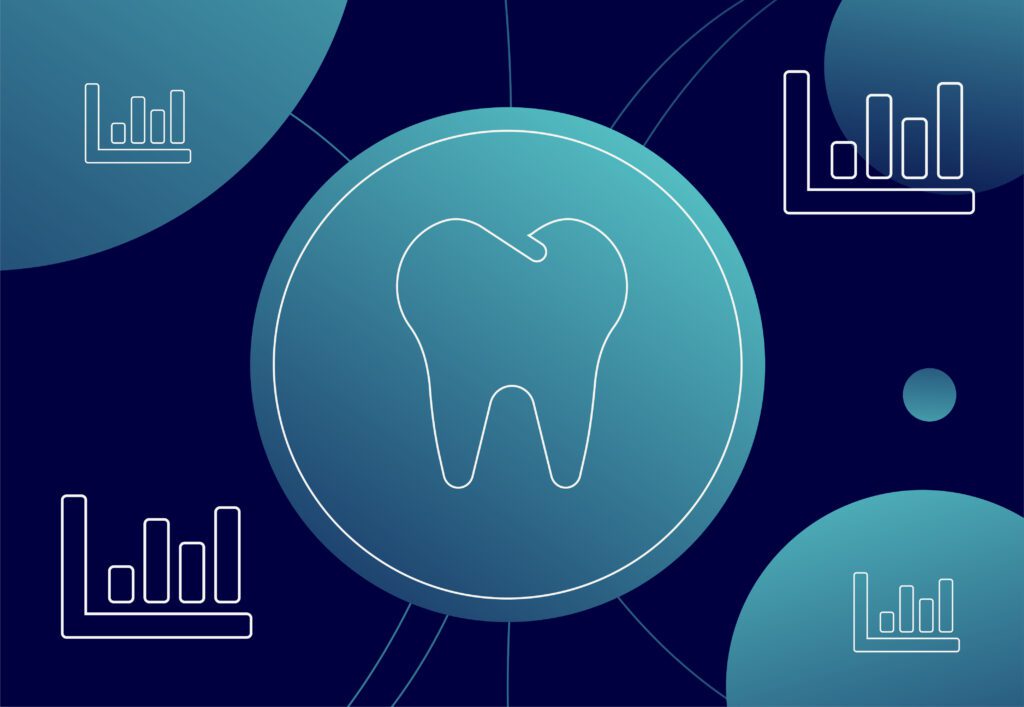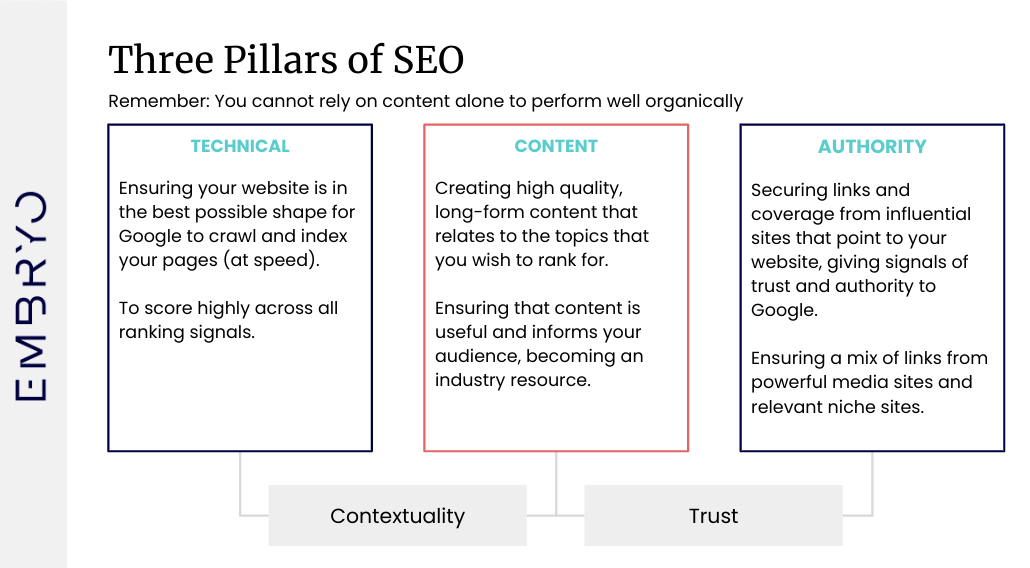
Dental SEO: A Complete Guide for 2024

SEO for dentists is a great (and cost-effective) way to get your website seen by potential clients. If your dental website has seen a drop in traffic, is failing to show up in Google for your key services, and is not attracting new patients, it’s time to invest in SEO.
At Embryo, we’ve worked on dental SEO campaigns that have successfully got dental clients on page 1 of Google for multiple commercial terms. In this blog, I’ll be taking you through some of our proven strategies and techniques that will help to enhance your online presence and improve your search engine rankings.
Ready to drive more patients to your practice? Follow my top tips!
What is dental SEO?
Dental SEO involves both on and off-page practices, from optimising a website for relevant keywords to fixing broken links to creating an XML sitemap. Whilst there’s no standard recipe for every website, there are certainly tried and tested methods of giving a dental website the best chance of success.
This specialised branch of SEO often focuses on helping a website show up in the search engine results pages for terms such as ‘dentist near me’, ‘teeth whitening kits’ or ‘dental practice in Manchester’. Each website has its own technical issues to fix and content to improve, so it’s important to conduct an SEO audit to determine the best approach for your website.
Key SEO strategies for dental practices
SEO for dental practices incorporates three key elements: content, technical and authority. All three of these areas must be optimised effectively to maximise the possibility of ranking. Google has over 200 ranking factors, some are proven and some are suggested by experts. So, there’s a lot of work to be done from a content, technical and authority-building perspective!

Technical
Technical SEO requires attention to detail and ongoing site maintenance. Factors such as load time, navigation and mobile-friendliness are verified ranking factors, as they make a website easier to crawl. Without technical SEO, your pages won’t be accessible and therefore will never rank for dental terms.
- Improving site speed: Page speed optimisation refers to improving how quickly a website loads for a user. Fully functional websites are user-friendly, and Google rewards user-friendly websites. The faster your site loads, the longer people stay on your website. Try compressing your images, reducing redirects, enabling browser caching and more.
- Updating title tags: Title tags provide context to users and search engines about what each page is about. Relevance is a ranking factor, and optimising title tags improves the relevance of your pages for relevant keywords.
- Structured data markup: Implement schema markup to give search engines more context about your dental practice, like your business name, address, phone number, opening hours, and reviews.
- XML sitemap: Create and submit an XML sitemap to search engines – it’ll help search engines discover and index all the right pages on your website. This data shows Google the structure and hierarchy of your website.
- Internal linking: Internal links in the navigation and content help distribute authority between pages and form connections. Not only does this enhance user experience, it also shows Google how your pages are interconnected.
Get your dental website in good technical condition and follow our full technical SEO checklist!
Keyword research
To start getting your dental practice noticed by search engines, you need to carry out keyword research. Competition between dentists is intense, with numerous local dental practices all aiming to rank for the same keywords.
The good thing is that not every dental practice will have an SEO-optimised website. That’s where you stand out and reel in the patients from Google.
Start by mind mapping your core services and get into the mind of your target audience. What are they looking for? From here, use a tool like AHRefs to find out which keywords to target. Assess the search volume and difficulty to determine the most valuable keywords.
Instead of going after competitive keywords like ‘dental practice’, choose niche keywords and create pages that target specific keywords:
- Root canal
- Children’s dentists
- Emergency dental appointments in [city]
- Teeth whitening
When it comes to optimisation, make sure your chosen keywords are featured in the URLs, metadata and on-page content. This consistent usage of the correct keywords will help search engines match your website with the relevant search queries.
Localisation
As I said earlier, it’s not the best idea to target highly competitive keywords. Alternatively, consider optimising for local searches. Using local SEO tactics, you can generate quality traffic from users looking for dental services in your specific geographic area.
Aside from sprinkling your location-based keywords through your content, consider setting up Google My Business. This free tool lets you create a business profile to ensure you appear in Google Maps and all relevant local search results.
Need help thinking of content for your strategy? Explore our guide on local SEO content types.
Content
Creating content is an integral part of your overall SEO strategy for your dental business. No matter what industry you are in, quality content creation should be a regular part of your marketing activity. But why?
Google needs to understand what your website is about, and can only rank you for relevant keywords surrounding your business through the content on the page. Without content, there is nothing to rank. Craft content that shows your expertise but also speaks directly to the interests of your potential patients.
- Landing pages: Produce SEO landing pages for each of your services – but don’t leave it blank. Create helpful content about your prices and processes and answer common questions to provide value.
- Business information: Google will only reward trustworthy websites with top rankings. Start creating content that details your business history, certifications, affiliations, qualifications, and anything that demonstrates your credibility as a practitioner.
- Guide content: The best thing you can do to stand out from competitors is to plan a blog schedule. Write guides and FAQ content on everything dentistry – this helps you rank for more keywords and show up more often in the search results.
Content ideas for dental SEO
After optimising your commercial pages with primary keywords, you should build topical authority by producing quality content based on long-tail keywords. This is where you delve into commonly asked questions and provide long-form, helpful blog content.
Here’s a few dental keywords to get you started:
We recommend producing 2-4 blogs a week to build brand awareness. Websites with active blogs have 434% more indexed pages than those without, which is why user-focussed content is so crucial to organic success.
Dental SEO FAQs
What is the most important thing for dental SEO?
E-E-A-T (expertise, experience, authority, trustworthiness) is incredibly important for businesses in the healthcare industry. Think author bios, About Us page, homepages and testimonials – everything that showcases your authority in the industry”. – Ben Carter, SEO Account Manager.




